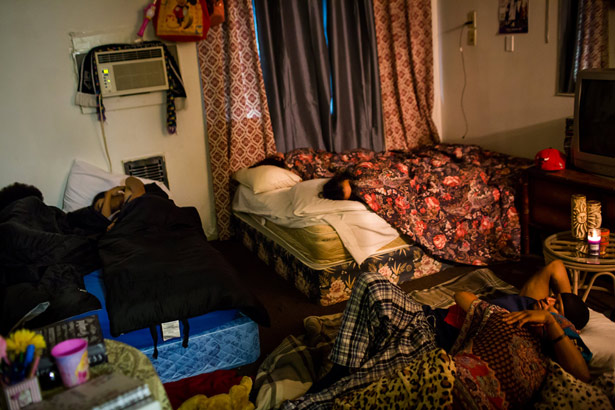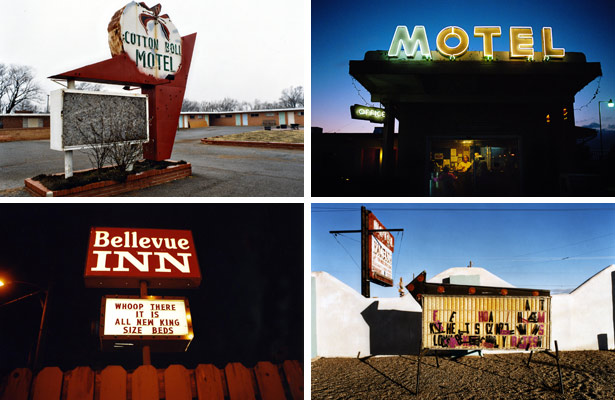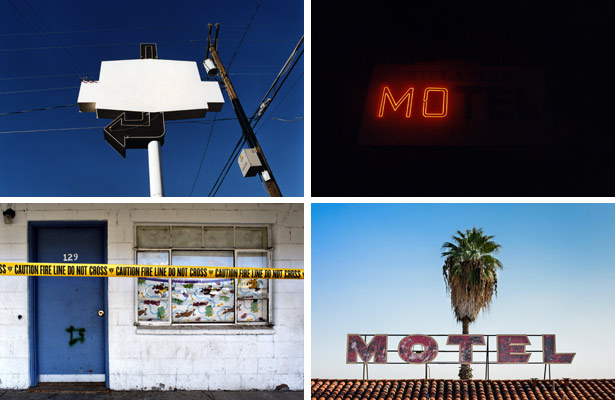The Royal Park Hotel is a hulking brute of a building in Los Angeles’s Westlake neighborhood, a few miles from downtown. With its chain-link barricades, its entry passage through an underground garage, and its strict security procedures for visitors, it would feel like a fortress against the squalor of its surroundings if the blight weren’t even more pronounced on the inside.
Guests at the Royal Park looking for drugs don’t even have to leave the building to find them; in fact, the motel is where people in the neighborhood come to score. “You got people who come in the front of this building at 2, 3 in the morning,” says Monica Nixon, whose family is staying at the motel. “And they’ll ask, ‘Can you go up there and get me crack? Can you go up there and get me meth?’ I call it the Twilight Zone.”

Monica and her family outside their room
Monica moved into the Royal Park Hotel in August, after being evicted from her apartment. She and her four kids—Honesty, Johnny, Steven and Savannah—live in a unit that looks to be around 150 square feet between the bedroom, the bathroom, the closet and the kitchenette. When it’s time to go to bed, Monica’s kids curl up on two mattresses. Monica sleeps on a couch donated by Savannah’s school.
The crowded halls of the Royal Park present dangers in their own right. On Christmas Day of last year, a fire ripped through the motel (then known as the J.J. Park, and before that the Nutel Motel: the building’s name, like its clientele, is transient). A tenant had left a hot plate unattended. Six people were injured, but that number could have been higher if residents hadn’t pulled together to help one another out of the burning building. “A lot of people here have walked a hard road,” Monica said. “But when tragedy happened, we saw the heart of those who still got heart left.”

Monica started out paying $270 a week for her room at the Royal Park, but once she became a long-term tenant, the motel manager reduced her rent to $870 per month. Even in LA’s overheated real-estate market, Monica’s rent is not cheap. But for indigent families like hers—and there are dozens of them staying in just this one motel—saving up enough cash for first, last and security on a regular apartment isn’t an option. Nor, in many cases, are a credit check, a bank statement and a list of professional references.

Popular
"swipe left below to view more authors"Swipe →
All over Los Angeles and all over the country, budget motels like the Royal Park serve as semi-permanent residences for families too poor or too financially unstable to afford regular rental units, and not lucky enough to have obtained a decent apartment out of the grossly inadequate stock of affordable housing in the United States. For those with criminal convictions in their past, these motels can be the only option left: public housing projects can and do reject applicants with criminal histories, and many former felons erroneously believe that they are ineligible for subsidized housing by law.

Monica’s son going to sell candy to raise money for the family
Often, the motels are located on once well-trafficked county roads rendered obsolete by the interstate highway system, or in once fashionable urban neighborhoods that have fallen into oblivion. Along these forgotten tracts, the supply of surplus motel rooms in want of visitors meets the demand of chronically poor families without steady shelter.
“Families who end up homeless are not so visible,” says Joel John Roberts, CEO of PATH, a network of agencies in Southern California that provides services and advocacy for the homeless. “We are seeing more and more families hidden in small motel rooms.”

Over a period spanning almost two decades, photographer Elizabeth Lloyd Fladung has shot pictures of dozens of families like Monica’s in cities, towns and exurbs in every part of the country. Her collection is a family album of an American underclass.
“I don’t think many people, when they think of poor families in America, think of a five- or six-person family living in one room with no kitchen,” Elizabeth says. “The sight of these iconic structures now serving as home to scores of destitute people who don’t seem to have any chance at the American Dream really shows just how little infrastructure there is to help poor people in need, and how much damage decades of wage stagnation has done.”

The circumstances that force the families into these latter-day tenements are as varied as the families themselves. Some of these hidden homeless, like Monica, are unemployed and on public assistance. Others, like Denise, work multiple jobs.

Denise, left, outside the Masters Inn
In the hackneyed language of the DC Beltway, Denise works hard and plays by the rules (at Denise’s request, The Nation is using pseudonyms in this article for Denise and her family). When Elizabeth met her last November, she was working as a hotel housekeeper in Mount Pleasant, South Carolina. Her job provided her with health benefits and a 401(k) retirement plan, and paid $9.35 an hour.
Denise’s hourly pay rate was more than two dollars above the federal minimum wage. Yet if she were to have relied on her earnings from her job at the hotel alone, Denise and her three children would have had to survive on an income 25 percent below the federal poverty level.
So five days a week, she supplemented her income with a second job, cleaning the office of a brand-name technology company. That job, which paid $8 an hour with no benefits, nosed her household just over the official poverty line.

Denise’s children inside the family’s room
On most nights, Denise would finish her workday at 10 pm, twelve hours after starting it. Then she returned home to a roach-infested room at the Masters Inn, which she shared with her mother, Bella, who is on dialysis for diabetes, and her kids, Owen, Jackie and Mila.
Before Denise moved to the Masters Inn, she was staying with her mother and father, who lived in a double-wide trailer and were behind on their mortgage payments. Then her father passed away abruptly in July from a brain aneurysm. Denise and her mother spent most of their savings on his funeral, and were forced to give up the trailer. Denise had been offered a low-income housing unit for about $500 a month, but she had heard about murders in the apartment building and felt it was too unsafe for her and her children. After Denise and her family had moved from motel to motel, Elizabeth ran into her outside the Masters Inn. (Not long after these photographs were taken, Bella moved away from the Masters Inn, and we lost touch with Denise.)

Though Denise was paying more for the motel room—$230 a week—than she would have for an apartment, it was impossible with her wages to save enough to put a deposit down. “I try to save money up, and days that I’m off, I look for apartments that can help me out,” she said. “They want the money straight up. Like, the whole package.”
Elizabeth found Denise the way she’s been finding families to photograph since she started the project as an art school student: she drove around looking for motels with signs of life outside—belongings piled up in front of rooms, lawn chairs with cigarette butts scattered on the ground, bicycles leaning against walls. Before getting in her car, she sometimes looks up motels with one star reviews on Yelp, and descriptions like the single review for the Masters Inn: “Do not stay here, there were four police patrolling the property. They advised we leave.”

Bella cooks dinner for the children while Denise works her second job of the day
When Elizabeth approached Denise in the late afternoon, Denise was understandably hesitant to share her life story with a camera-toting stranger. But after a few minutes of chatting and shooting pictures of her family outside, Elizabeth followed Denise into her motel room and photographed Bella making hot dogs and corn for the kids. The family sat down in front of the television to eat. Owen hid in a corner because he didn’t want to finish his corn. Bella suspected he was sneaking his apple sauce, which he wasn’t supposed to eat until he’d finished all of his dinner.
The next day, Elizabeth returned with prints of the portraits for the family to keep. Bella was home, and Elizabeth listened to her describe her ongoing struggle to retrieve the funds she is owed by the Social Security Administration and the Veterans Administration following her husband’s death.
Soon, Denise and her kids returned from Dollar General with bread, crayons, a coloring book, and packs of ramen noodles for dinner. As she unpacked her groceries and tended to her kids, she chatted with Elizabeth for about twenty minutes. Then she had to rush out the door to beat the traffic on her thirty-minute commute to the tech company office, where she would work a four-hour evening shift for $32, before taxes.


